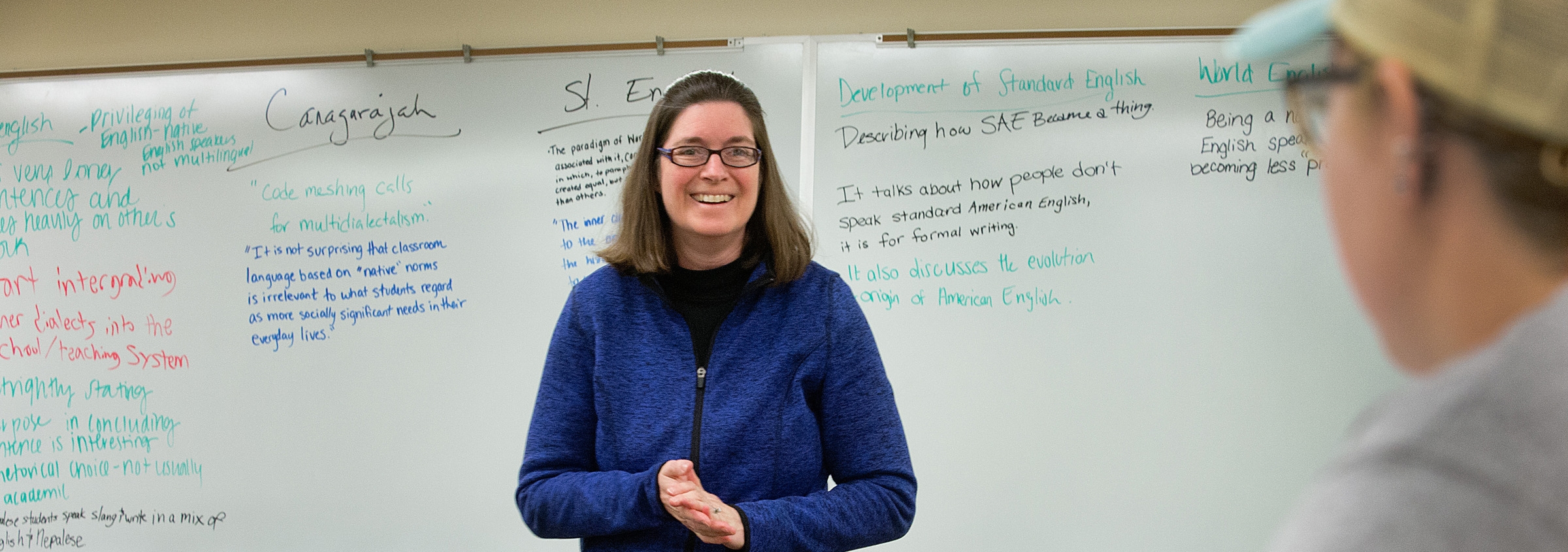Minor in Writing
Craft important messages with a minor in writing from the University of Mount Union. The program combines creative genres (poetry, fiction, creative non-fiction) and professional writing to develop you into a well-rounded scholar. You will also read and analyze the work of other writers to understand their thought processes and strategies.
About the Program
Complement the dynamic coursework, by traveling to conferences where writers read their work and discuss the act of writing. Immerse yourself in the world you want to be a part of by also participating in public opportunities to read and receive feedback on your own work.
Featured Course
WRT 199: Introduction to Grant Writing
This course will give you the knowledge and confidence required to develop and submit grant proposals. You will learn the basics of grant writing, including how to identify potential sources of funding, how to write a compelling proposal, and how to maximize the grant’s chances of success. You will learn how to do the research that supports grants, how to create a budget, and how to write using the evaluation criteria established by funding organizations. If you are contemplating a career in the non-profit, government, or community sectors, this would be an ideal course for you.
-
Curriculum
Writing CurriculumAs a writing minor at the University of Mount Union, you will analyze poetry and fiction, explore a wide variety of writing styles and genres and learn the foundations of professional writing. You will read numerous pieces of literature and gain hands-on experience by expressing yourself through your own writing pieces.
-
Learning Objectives
Upon graduation, students who minor in writing will be able to:- Recognize and respond to a variety of audiences, contexts, and purposes
- Craft sophisticated print and digital texts in a variety of genres, both creative and professional
- Demonstrate growth as a writer by producing a professional-quality portfolio
- Evaluate the appropriateness of rhetorical choices in own and others’ texts
- Arrange the organization of texts appropriate to the rhetorical situation
- Recognize and self-edit errors in written discourse
- Produce complex texts with correctness in syntax, grammar, usage, punctuation, mechanics, and spelling
- Demonstrate an advanced sense of coherence and cohesion in written discourse
- Consider, apply, and control stylistic options (prose style, figurative language, voice, register, tone, word choice, etc.
THINK LIKE WRITERS- Talk and write about their writing and consciously synthesize and integrate insights from one project into another
- Articulate a statement of identity as a writer (including style, voice, and ethos)
- Use multiple research methods (both primary and secondary), utilizing and documenting their research in their writing
- Develop a sophisticated vocabulary for thinking, talking, and writing about their own and others' process of writing and the texts they produce
- Assess and respond to other writers, paying attention to the choices writers make, the reasons for those choices, and the effect those choices have on an audience
- Recognize and gear writing toward a pluralistic and diverse world
READ LIKE WRITERS- Demonstrate an understanding that writing emerges from an existing conversation and be able to join that existing conversation
- Read widely and read a variety of texts, both creative and professional in nature
- Exhibit knowledge and reading skills by effectively incorporating their reading into their writing
-
Experiential Learning
Significant ExperiencesStudents will develop broadly as writers through in-class work and significant experiences outside the classroom including trips to hear writers read their work, conferences in which writers discuss the act of writing, and public opportunities for students to read and receive feedback on their own work. These experiences prepare students to enter the workforce or a graduate program.
Student Organizations- The Digital, Written and Oral Communication Studio is an interdisciplinary writing support center offered free of charge to Mount Union students. The Studio offers English and Writing students an opportunity to tutor others’ writing and, in the process, become more effective writers and communicators. Typically, half the 20 yearly staff positions are filled by English and Writing students.
- The Calliope, The University of Mount Union’s annual literary and arts magazine, first appeared in 1954. Today, it operates as a recognized student organization and students who participate in the organization publish two magazines annually (Calliope and The Agora), work with nationally recognized writers and artists as judges, and gain experience in event management, editing and publications management. Calliope has recently expanded to accepting submissions of poetry, fiction, creative non-fiction, drama, and all forms of visual art from students at other regional and national institutions, as well as from Mount Union students, alumni, faculty and staff.
- Sigma Tau Delta is an international English honor society. Its central purpose is to confer distinction upon students of the English language and literature in undergraduate, graduate, and professional studies. Sigma Tau Delta also recognizes the accomplishments of professional writers who have contributed to language and literature.
- Book Club is a student-led organization on Mount Union’s campus. The organization promotes an outlet for creativity and curiosity by hosting and attending intellectual and cultural activities pertaining to literature and/or writing.
